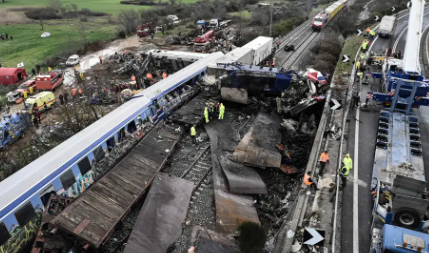Greeks Demand Justice for Victims of Tragic Tempe Train Crash
Introduction: A Nation in Mourning
The Tempe train crash, one of Greece’s deadliest rail disasters, has left the nation in shock and mourning. The tragic collision, which occurred on February 28, 2023, resulted in the deaths of 57 people and injured dozens more. As investigations unfold, tens of thousands of Greeks have taken to the streets, demanding justice and accountability. The disaster has exposed deep-rooted issues within Greece’s railway system, sparking national outrage and calls for urgent reforms.
The Tragedy: What Happened?
On the fateful night of the crash, a passenger train carrying over 350 people collided head-on with a freight train near the city of Larissa, in central Greece. The impact caused multiple carriages to derail and burst into flames, trapping passengers inside. Many of the victims were young university students returning to Thessaloniki after a holiday break. Survivors recounted harrowing experiences, describing the explosion, screams, and desperate attempts to escape the burning wreckage.
Public Outrage and Nationwide Protests
In the aftermath of the disaster, grief quickly turned into anger. Tens of thousands of Greeks flooded the streets of Athens, Thessaloniki, and other major cities, holding banners with slogans such as “It wasn’t an accident, it was a crime.” Protesters blamed government negligence and mismanagement of the railway system for the tragedy. Strikes by railway workers further intensified the demonstrations, as they had long warned about unsafe conditions and outdated infrastructure.
Government Response and Promises of Reform
The Greek government acknowledged systemic failures and vowed to modernize the railway network. Prime Minister Kyriakos Mitsotakis initially attributed the crash to “human error” but later admitted that the railway system suffered from decades of neglect. In response to the public outcry, several railway officials resigned, and criminal charges were brought against key personnel. However, many Greeks remain skeptical, arguing that past promises of reform have not led to meaningful change.
Neglected Railway Infrastructure: A Disaster Waiting to Happen
The Tempe crash exposed serious safety concerns that had been ignored for years. Experts revealed that Greece’s railway system lacked modern signaling and automated safety controls, making it vulnerable to human mistakes. Reports showed that European Union funds allocated for railway upgrades were mismanaged, leaving the network in a deteriorating state. Railway unions had repeatedly warned authorities about the risks, but their concerns were largely dismissed.
Legal Battle: Seeking Accountability
Families of the victims have initiated legal proceedings, seeking justice for their loved ones. The investigation is focusing on potential criminal negligence, with charges of manslaughter and endangerment being brought against railway officials. Many believe that the blame extends beyond individual workers to the government and private companies responsible for railway operations. Lawyers representing the victims’ families argue that the state failed in its duty to ensure passenger safety, demanding transparency and accountability in the judicial process.
The Human Cost: Stories of Loss and Survival
Behind the statistics are heartbreaking personal stories. Many of the victims were young students with bright futures ahead of them. Families have shared their grief, recalling the last phone calls they had with their loved ones before the crash. Survivors have described their trauma, with some struggling to return to normal life. The tragedy has united the nation in mourning, with memorials and tributes being held across Greece to honor the victims.
A Call for Lasting Change
The Tempe train crash has become a turning point for Greece, forcing the country to confront the failures of its transportation system. Citizens are demanding not only justice for the victims but also lasting reforms to prevent future tragedies. Many activists and opposition leaders argue that public safety should take precedence over political and financial interests. The coming months will determine whether Greece can turn this tragedy into an opportunity for meaningful change.
Conclusion: The Fight for Justice Continues
As Greece mourns the loss of 57 lives, the demand for justice and accountability remains strong. The Tempe train crash was not just a tragic accident—it was a result of systemic failures that had been ignored for too long. The ongoing protests and legal battles highlight the determination of the Greek people to ensure that such a disaster never happens again. Whether the government follows through on its promises remains to be seen, but one thing is clear: the victims of Tempe will not be forgotten.
Read More: Lukashenko Claims Seventh Term in Controversial Belarus Presidential Election


Leave a Comment